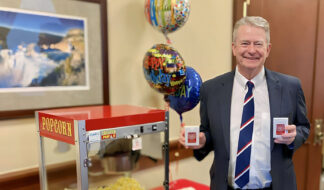By Dan Woog
The OutField
Each year at the NCAA women's basketball Final Four, the scene was the same. Pat Griffin sat at the Women's Sports Foundation's "It Takes a Team" booth, handing out literature about LGBT issues in athletics. Each year, Griffin – a former coach, professor emerita at the University of Massachusetts, and director of "It Takes a Team" – would sneak over to the Athletes in Action (AIA) and Fellowship of Christian Athletes (FCA) booths, surreptitiously seeking out antigay materials.
Last year, she decided to introduce herself. Soon Griffin and representatives from the two Christian organizations pulled up chairs, and engaged in a spirited – but respectful – conversation.
"We ended up liking each other," Griffin recalled. "That surprised me, because I was 'Christian-phobic.'" The women shared stories of feeling disrespected – Griffin as a lesbian, the others as Christians – and realized that, despite their differences, they believed in their own truths, and respected the others for believing in theirs.
Inspired by that meeting, Griffin and FCA's Debbie Haliday – athletic director and coach at Hillcrest Christian School, and a former Division I basketball and softball player – helped organize a panel at this year's Women's Basketball Association Conference in Tampa. Titled "Seeking Common Ground," it featured three lesbians and three Christians. Their frank discussion – including a provocative question-and-answer session with 40 audience members, evenly divided between lesbians and Christians – galvanized everyone.
The panelists' worst fears – that a bible-thumping Christian or agitated lesbian would disrupt the proceedings – were not realized. Instead, each woman spoke about her hopes and fears. Together, they indeed found common ground.
"We all love women's sports, and agreed it's been good for us," Griffin said. "We all recognized the need for respect and safety in sports. I realized I don't need everyone to accept me as a lesbian. But I do need to participate in sports safely. We all agreed that's important."
"I felt well respected by Pat, though my choices in life are different than hers," said Haliday. "She did not in any way shame me, or cause me to feel unaccepted. I was very grateful for that, and I deeply desire to do the same. I don't see Jesus isolating Himself in His days on earth, and I want to be like Him in every way."
Each panelist saw the others as unique individuals. An especially poignant moment came when AIA staff member and former Division I basketball coach Tracey Wolff described her conflict about a gay relative's wedding. Many Christians urged her not to attend, but she went. After the panel, a few lesbians told Wolff how hurt they felt when loved ones did not attend their own ceremonies. "Going to the wedding was a very difficult decision, but hearing from those ladies reinforced that it was the right decision for me," Wolff said.
"Both groups have been standoffish to each other," noted Helen Carroll, director of the National Center for Lesbian Rights' "Homophobia in Sport" project, and a former athletic director and basketball coach. "We didn't know how to approach each other. Pat walked across that bridge, and made it happen."
As the panelists spoke, barriers fell. Carroll said she found common ground with the Christians in two important areas: the desire to give all athletes a fair chance, and the responsibilities of being a parent.
"As leaders, we all have a responsibility of showing others that we can transcend our differences," Carroll said. For example, believing that homosexuality is wrong, a Christian coach had refrained from telling a lesbian athlete to go to the campus LGBT center. At the panel, the coach said she now realizes it is her duty to go see how the center's resources can help athletes.
For her part, Carroll said, "Now I don't feel so reticent talking to Christian coaches who may feel my lifestyle is not sanctioned by God. I can approach those coaches much more easily now."
Importantly, Carroll added, "We agreed not to try to change anyone's minds. We know there are differences we'll never agree on. That's not a negative; it's just an acknowledgment of what not to focus on. This was more about finding common ground, to help all our student-athletes."
A highlight for Carroll came when a coach in the audience said, "If Jesus walked through that door, He would be proud of everyone one of us today."
Griffin concluded the panel by saying, "I can play on any team with any woman here, or coach any of you." Wolff said later, "That's so true. We're all on the same team."
When the panel was over, Griffin walked up to the AIA and FCA booths. The women greeted her warmly, and introduced her to other Christians. "I felt welcomed, but I didn't feel compromised in my beliefs," the LGBT activist said. "It just felt right."









